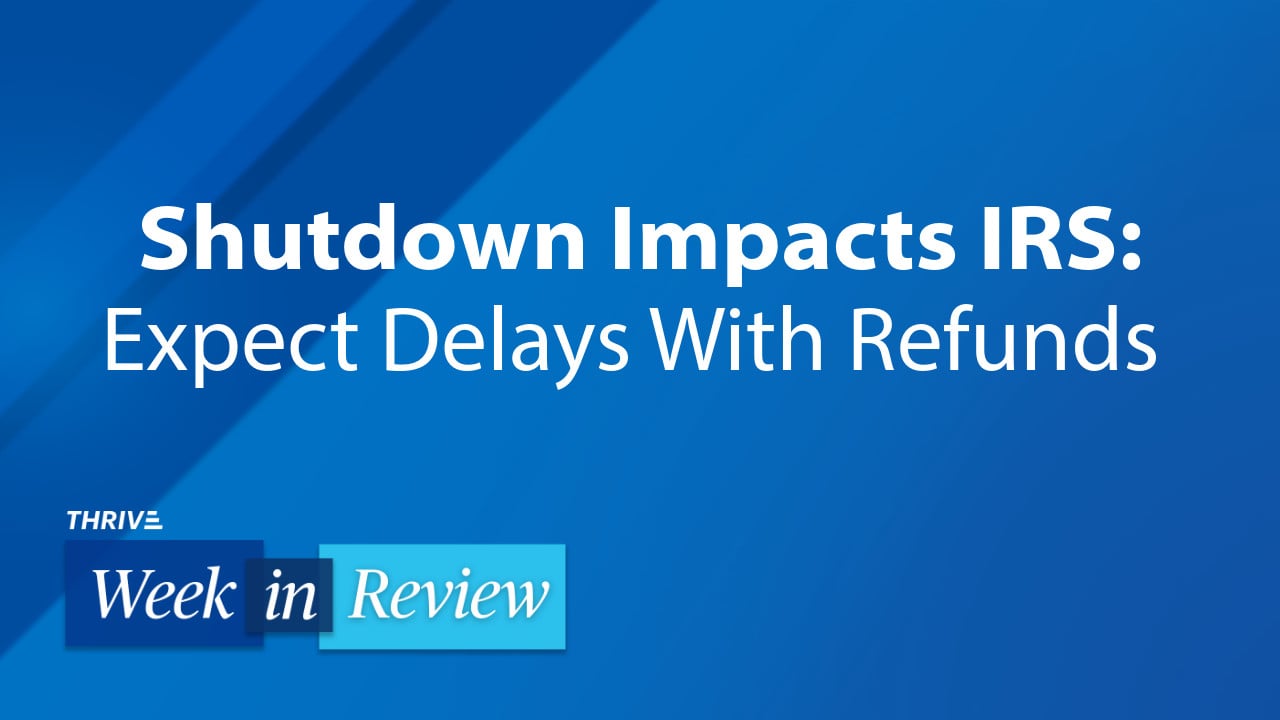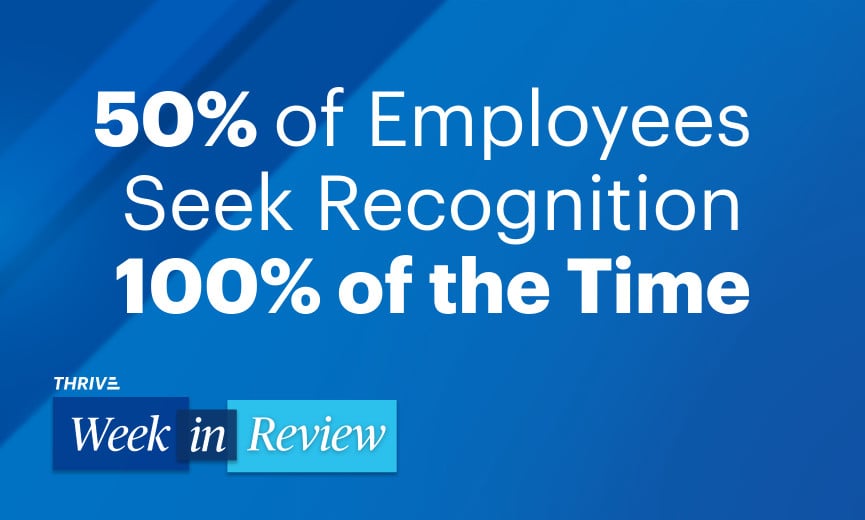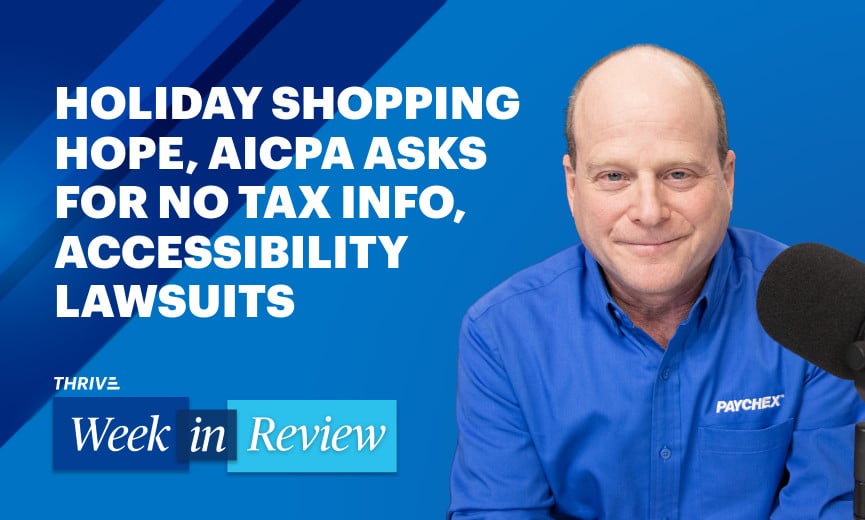- Thrive
-
Temporada
4Episodio131
Opiniones encontradas sobre la subida del salario mínimo, el distintivo del café y el nuevo impuesto sobre el patrimonio

Podcast •

Resumen
A recent survey finds that while the majority of small business owners are in favor of a minimum wage hike, half of respondents also feel that an increase would negatively impact their businesses. Host Gene Marks understands this paradox and explains why business owners would have these contradictory opinions. Gene also touches on the new workplace phenomenon called coffee badging and why one CEO isn’t opposed to this practice, as well as a new editorial in the Wall Street Journal that cautions against the slippery slope of new unrealized gains taxes 10 states are currently flirting with. Listen to the episode.
Ver transcripción
[Gene Marks, host]
Hey, everybody, this is Gene Marks, and welcome to this week's episode of the Paychex THRIVE Podcast Week in Review. This is the weekly podcast where I take a few items of news that impacts you and your small business, and we talk a little bit about it. So what do you say? Let's get to it.
The first item comes from cnbc.com. There was a new poll that CNBC did this reporting on. It was a CNBC Survey Monkey small business survey, and it was about minimum wage. And you know what was found? It found that 61% of the 3,000 small business owners supported raising the minimum wage in their state, even while half of them, exactly 50%, believed it would make it difficult to afford the workers critical to their business. It is a very interesting paradox. And you know what? I kind of get that paradox. I mean, we all want our workers to be paid a fair wage. We understand that. And we also all think that a minimum wage, though, if it's hiked too far, could have a significant impact on the way we do business.
But I think I have a reason why this paradox does exist. And it's this: In most states, regardless of what the minimum wage is, most employers pay more than the minimum wage. That's what I'm saying. I mean, listen, there are more than half of the states in this country, or about half of the states in this country, that are still adhering to the federal minimum wage is $7.25 an hour. I live in a state like that in Pennsylvania. And let me tell you something. I don't know any clients of mine who are paying their workers $7.25 an hour. It is in most of the times, if not all the time, a lot more than that. In fact, I don't even know who pays $7.25 an hour anymore, unless it's a high school kid working for like a swimming pool during the summer. And even then, it tends to be a little bit higher. So, I kind of get it when a lot of business owners, 60% of them say, hey, we do support raising the minimum wage. I think the reason why is because they're already paying more than the minimum wage.
So, they're like, yeah, we're doing that. So, we would support that there would be a raise to the minimum wage. But I think what they're also saying is that there is a limit. Obviously, if you're paying your workers $12 an hour, $13 an hour, and then the state minimum wage goes up to 15 or $16 an hour, that obviously has a negative impact on you. And that could be a problem. Minimum wages continues to be, like a major issue, and it's a major debate point as well. I have written about this and talked about this for years. There are numerous studies that I can point you to that show that an increase in the minimum wage harms businesses. And I can also point you to numerous studies that say an increase in the minimum wage has no impact on businesses either. So, it really continues to be a debatable thing. It depends on the business, depends on the region, depends on the business owner, and how they manage their business. But the bottom line is this: You can tell small businesses are very mixed about minimum wage increases. But again, even though 60% of them say they would support a minimum wage increase, I still believe it's because many of them are already paying more than the minimum wage. And that is why it is. Not quite sure how you feel, but that's how I feel.
The next issue, the next news item is reported in my hometown, nbcphiladelphia.com. They did a story on one business owner, a CEO, who actually is in favor of coffee badging.
Do you know what coffee badging is? Coffee badging is this practice, it's become popular on social media, where when employers are requiring their employees to come into the office, the employees come in, swipe their badges, have a cup of coffee, and then leave. It's called coffee badging. Now, when you hear this, you're like, “Jeez, I mean, that's kind of taken advantage, isn't it? I mean, if we're asking you to be in the office, we're asking you to be in the office.”
And we can get into a whole debate about remote working and work from home and what makes more sense. But I think it's a fair thing to say that businesses do need to have their employees in the office for at least a portion of the week because it does help with innovations and ideas and sharing ideas and doing things together and it helps with the company culture. Unfortunately, though, some people have resisted this. Some business owners have taken this coffee badging practice as an affront, as like an insult to their request to have their employees come into the office. But this one CEO, his name is Frank Weizeaupt, he's the CEO of a Boston-based video conferencing maker called Al Labs. He actually thinks coffee badging is fine.
And you know why he says this? We hire people to do a job. I don't hire people to watch them work. I do love the in-office participation when we get it, but I want it to be organic. In other words, he likes to have people come into the office. He thinks it's good to have people from a cultural, from an innovation, from an idea standpoint, but at the same time, it has to be organic. It can't be forced. So, when he sees people doing this strict coffee badge, strict in-office policies, he thinks it kind of hurts. The office has a role, but mandating that you must come into the office on this day, at this time, and leave no earlier than this time, this is a dead concept, he says. Monitoring employee activity is a really slippery slope and you're going to lose trust. I don't know how you feel.
Do you want to require your employees come into the office when you make that requirement? Do they come in? Do they have to come in at a certain day and a certain time? Or do you leave that up to them? My feeling is if your employee is part of a team, say your customer service group or your sales group, or even your finance group, let the leader of that team make a decision as to when they want their employees in. And hopefully they'll have their team members come in at a time when they can liaise with each other and hang out and be together and maybe innovate or come up with some ideas or at least improve the culture.
But forcing people to come in at certain times of the day, I get it. I sometimes do understand. I do agree with Weizeaupt when it comes to just swiping your tag, getting a cup of coffee, and leaving. Sometimes forcing people to come in at certain days and times may not be the best answer. It really depends on the team that you're working with. So interesting to hear different perspectives on coffee badging.
Finally, there was an editorial written in this past week in the Wall Street Journal about wealth taxes. The state of Vermont is the latest that is producing a wealth tax on unrealized gains. According to the Wall Street Journal, the state's top legislature has spent recent weeks pushing bills that would dial up taxes now on high earners. The biggest reach, they say, is a proposal to tax the paper gains from assets above $10 million. The plan would slap an 8.75% tax rate on half of those gains.
So, they say that means that a family whose business gains $3 million in value could owe an additional $131,000, even if they don't take out a single dollar of cash. Now, Vermont is one of ten states that are, according to the Journal, flirting with taxing unrealized gains and unrealized gains is a slippery, slippery slope.
I realize that you're trying to just limit it to the wealthy earners. But who knows if it starts coming down to the middle class and taxing. An unrealized gain is really, really hard thing to do. Suppose you have a piece of art. Do you know if it's appreciated during the year? What happens if you own a house, and with the real estate prices being what they are, that appreciates? You would be taxed on the appreciation of some of those assets, even though you didn't realize any cash from selling that asset. Now, again, if it's going after wealthy, the super-wealthy people, I understand the political reasons behind that. But what kind of concerns me is that if it starts ratcheting down to others that are not really part of the super-wealthy group, it's certainly an opportunity for us accountants, because going through and getting valuations done and taxing those gains, that sounds like a lot of big services that we can be performing, but it doesn't really seem like a great idea and I'm not even sure that the Supreme Court would cast a positive eye on this practice.
But just to make you aware, ten states are flirting with this increase in taxes by taxing unrealized capital gains. We want to be aware of that if your state is affected, and certainly if maybe you are, depending on the assets that you have.
My name is Gene Marks and you have been listening to the Paychex THRIVE Week in Review Podcast. Hope you got good information from this. We'll be back next week with a few items in the news that impacts you and your business and some thoughts on how it impacts you and how to navigate around that. Thanks very much. We'll see you again soon.
This podcast is property of Paychex, Inc. 2024. All rights reserved.

 Apple Podcast
Apple Podcast Spotify
Spotify iHeartRadio
iHeartRadio








